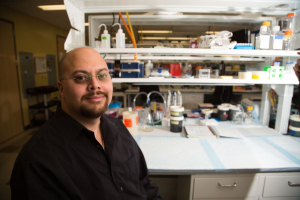Joseph T. Francis, associate professor of biomedical engineering, has earned four grants amounting to more than $4 million since he joined the faculty at the UH Cullen College of Engineering less than six months ago. Two of the awards from the New York State Spinal Cord Injury Research Board amount to $700,000, and grants from the National Institutes of Health (NIH) and the National Science Foundation (NSF) compose the remainder. The grants all relate to brain-machine interface (BMI) research that Francis began at SUNY Downstate Medical School in Brooklyn, N.Y., where he still maintains a laboratory.
Cumulatively, Francis’ projects aim to record brain activity from subjects to develop an autonomous brain-machine interface capable of learning what the user wants. With the NIH grant, he is studying the subjects in different situations to determine whether or not he can isolate reward expectations in meaningful ways from the summation of the communication between hundreds to thousands of neurons inside their brains. The NSF grant is enabling him to explore ways to tap into that behavioral reinforcement for optimal control of robotic systems.
The two grants from the New York State Spinal Cord Injury Research Board support a study that provides subjects with full-time access to a brain-machine interface that allows users to control a robotic arm using only the power of their thoughts. The brain machine interface used by the subjects is also equipped with sensory feedback, which is delivered directly to their brains by way of electrical micro-stimulation. Francis and his collaborators wirelessly record brain activity of the subjects as they grasp objects using the thought-controlled robotic arm. Francis is using the data extracted from the subjects’ brains to develop theoretical modeling for bypassing spinal cord injuries. His work could help patients with paralysis caused by spinal cord injuries and neurodegenerative diseases like amyotrophic lateral sclerosis (ALS) to move again.
